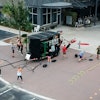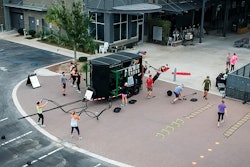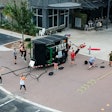Staff members at certifying organizations explain the benefits of hosting onsite certification events at fitness facilities.
If you've never hosted a certification workshop or training session at your fitness center, you might be wondering about the benefits, and what it would entail. While acting as host for one of these events might not be for all fitness center operators, there are many perks in terms of cost and staff hiring and training.
Below, four certification organization representatives answer some key questions for those fitness center operators who might be considering such a venture. These organizations aren't the only ones that offer onsite training; most certification organizations, for all types of training - group exercise instructors, personal trainers, management staff, safety and first aid, etc. - provide these types of opportunities at fitness facilities. The question is, is it for you?
Meet the experts
Mario Crespo, PresidentNational Educational Trainers Association (NETA)
Minneapolis, Minn.
Lauri Reimer, Director of Programming
Aerobics and Fitness Association of America (AFAA)
Sherman Oaks, Calif.
Angie Wickstrom, Director of Certification
National Federation of Professional Trainers (NFPT)
Lafayette, Ind.
Jay Del Vecchio, President of Operations
World Instructor Training Schools (W.I.T.S.)
Virginia Beach, Va.
What is the difference between an onsite certification course hosted at a fitness facility vs. one offered at the certifying organization's location?
Del Vecchio: Fitness facilities [must] first decide whether they want [to host] customized training [for] in-house staff only, or if they want to open it to the public. ... An onsite certification course for in-house staff would be truly customized to the fitness facility's needs. In addition to the core curriculum, which provides a foundation in varying subjects like management, marketing, finance, customer service, facility and risk management, [the certifying organization] could include policy and procedures specific to [the] company, and address issues and concerns that are particularly relevant. The program could be customized to specific departments in the facility and/or levels of staff. [Also], the classes would be scheduled at the location and times to accommodate maximum participation of all staff members.[Hosting] a fitness certification course at [the] facility [that is] open to the public can be a great recruiting tool, [and can] bring exposure to the facility. The certification courses would cover the core curriculum and would not be customized, but scheduling would be determined by space availability and convenience to the facility to avoid any disruption in business operations.
Reimer: AFAA's approved consultants [can] go right into just about any facility. ... [In addition,] AFAA provides a ... home study preparation portion for each certification - Personal Fitness Trainer (PFT), Primary Group Exercise, Step and KickBoxing - before [participants] attend a one-, two- or three-day weekend course. This [way,] ... participants can take their time preparing the materials in advance, and then take the entire program (the workshop, and written and practical exams) all in one weekend for PFT, and all in one day for the others. This is very convenient for most participants.
Wickstrom: The difference between an onsite certification course offered inside a fitness facility, as opposed to one offered inside the certification organization's location, will usually be length of course and subject emphasis. Generally speaking, the certification agency will not host an onsite workshop, but instead may offer educational sessions that incorporate more book knowledge but less hands-on activity - the kind of activity that you would normally expect with a course/workshop that takes place inside a fitness facility. The certification company's headquartered location may provide courses that extend over several weeks, while any course held inside a fitness facility (what we'll refer to as workshops) will only require a weekend obligation of the facility's space.
NFPT's workshops, provided inside fitness facilities, include an overview of material that has already been provided to the participant, with the expectation that the participant will be familiar with this material and come prepared with questions. Therefore, less time is required of a workshop than would be of a course offered inside the certification organization's location, which would be more of a start-to-finish approach to learning the material, with the certification exam taken at the end of several weeks.
A workshop's emphasis is teaching and reviewing hands-on and practical applications of the education to its participants; there are generally fewer participants because of space limitations, which positively impacts the instructor-to-student ratio. This method doesn't require an extensive amount of travel and related expense, as workshops are "portable" and can be offered virtually any time within any fitness facility that meets basic space requirements.
How much of a work commitment by management does hosting an onsite certification (or workshop) require?
Crespo: The host fitness facility [is needed to provide] lecture space, tables, chairs and equipment. We provide all the support materials to assist them in communicating our information to their staff and to other fitness facilities in their area, [and we] will advertise the workshop, register the participants and handle all the travel arrangements.Del Vecchio: Very little time is needed to select and execute a certification course. [W.I.T.S. has] a turnkey operation that we execute every semester with colleges and universities all over the country. ... For customized training, we want to spend some time with management to become familiar with the specific issues, concerns and training needs. We discuss scheduling and content to make sure we meet their training needs. We also want management's commitment to support their staff's attendance and participation. [Non-customized] courses would require very little time or work from management. We just need a classroom area that is available and accessible as scheduled.
Hosting InformationBelow is a list of contact information for the organizations quoted in this article. For a complete list of certifying organizations, go to www.fitnessmanagement.com/buyersguide and click on "Certification."
|
||
Reimer: AFAA provides all the promotional materials and publicity through mailings and its website. However, it is expected that the host will also promote the events internally by letting instructors, personal trainers and members in the gym know about it with sufficient time for participants to sign up and receive their study materials. A hosting kit provided by AFAA includes flyers that can be posted throughout the fitness facility or with employee pay checks. Some hosts even choose to advertise in their local newspapers. On the day of the workshop, there should be a room provided exclusively for AFAA so there are minimal distractions throughout the day.
For international programs, in addition to promoting and advertising the workshops, the host is responsible for collecting registrations, submitting payment to AFAA, and assisting with ground transportation and lodging for the workshop facilitators.
Wickstrom: There is very little work ... required by facility management on the day(s) of the workshop, or even in days leading up to the event. NFPT asks that facility managers post workshop information inside the facility to increase enrollment and awareness of the coming workshop, and, of course, management will make determinations regarding facility space, which must meet requirements for 15 or more people.
Are most onsite certification courses typically offered to in-house staff only, or are they open to other area fitness professionals? What are the pros and cons of this?
Crespo: Most workshop hosting arrangements are open to the public, although some facilities request private workshops.Del Vecchio: Both are common, however, onsite courses are mostly open to the public to recruit new talent for the host site. Our internship requirements help sites fine-tune that process indirectly.
Reimer: Most hosts opt to offer programs that are open [to] anyone. This allows for exposure through advertising in their community, especially if they are looking to recruit more certified instructors or personal trainers. Since the registrations are processed through the AFAA office, once the program is posted, anyone can sign up. The difference, though, is that host-site instructors receive a special discount price. [Some fitness centers have limitations, such as] high-security military bases (domestic and international) that are sometimes limited in their ability to allow civilians on base.
Wickstrom: The availability of the workshop to area fitness professionals working outside the facility is determined by facility management. If management prefers NFPT to provide the workshop to facility staff only, then NFPT will not allow for online enrollments, and will keep enrollment confined to staff only. Whether workshops are available to just staff or to the entire community, both options are available, and depend entirely on the goal of the facility operator. Is the greatest benefit of the workshop to train existing staff, or can the workshop be used for possible recruitment of new staff?
What are the main benefits to the fitness facility from hosting a certification (or workshop) event?
Crespo: The main reason facilities host is to provide certification and continuing education for their staff. Host sites also use ... workshops to recruit or train newly hired instructors and personal trainers.Host organizations receive some free passes to ... workshops and generous discounts for additional staff in exchange for providing the facility. Workshop sponsors also benefit from the media exposure because NETA advertises the events through mass mailings and public service announcements.
Del Vecchio: There are many benefits to hosting a certification event.
- Courses open to the public can be a great way to recruit new staff and increase public awareness.
- Certification/training exposure to your facility shows commitment to training and education to current members and the staff.
- Onsite hosting generates some internal funds, as W.I.T.S. pays a portion of the fees to the club for hosting.
- Hosting allows a graduate pool that can be reviewed through the internship process, which is much more beneficial than just an interview.
- Customized onsite training for in-house staff ensures that the scheduling, content and program meet your specific needs.
- There is consistency of training, education and certification standards [for staff], including written and practical testing.
- Many companies get a break on their insurance if they employ all certified instructors and trainers.
- Host sites are recognized as a center for continuing education and training if the facility continues to host programs.
- Sites have the convenience of hosting courses right in their own facility.
- In exchange for hosting, the facility receives an exclusive 25 percent discount and complimentary registrations. Corporate affiliates receive a 35 percent discount.
- Discounts and complimentary registrations are provided to staff who participate in the workshops and certifications being hosted.
- Sites are provided with advertising and marketing of their facility in all AFAA's promotional materials.
- Facilities benefit from recruitment. If expanding their staff of group exercise instructors and personal trainers, hosting allows facility managers a first-hand opportunity to identify possible new hires.
































